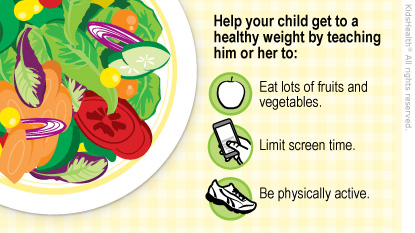Healthy Weight: How to Help Your Child
Children come in different shapes and sizes, but sometimes kids gain weight too fast. Help your child, and your whole family, make healthy food choices and stay active. These healthy habits can last a lifetime.


Build healthy habits:
-
Prepare meals at home when possible. Limit trips to restaurants and fast-food places.
-
Set regular meal and snack times.
-
Eat together as often as you can.
-
Don't force kids to eat. Teach them to listen to their body about when they're hungry and when they're full.
-
Don't use food as a reward or punishment.
-
Have everyone in the family eat all meals and snacks at the table, not while walking around or watching TV or other screens, including computers, tablets, and phones.
-
Make family rules about screen time. Don't let screen time get in the way of being active, getting enough sleep, and connecting with family and friends.
-
Help your child be active every day.
-
Kids who get enough sleep are less likely to be overweight later in life. Help your child get enough sleep. Sleep needs vary from child to child, but on average:
-
Kids 2–3 years old need 11–14 hours of sleep (including naps).
-
Kids 3–5 years old need 10–13 hours of sleep (including naps).
-
Kids 6–12 years old need 9–12 hours of sleep a night.
-
Teens need 8–10 hours of sleep a night.
-
Set a good example for your kids. Choose healthy foods, exercise regularly, limit your screen use, and get enough sleep.
Help your child get the best nutrition:
-
Offer nutritious meals and snacks. Follow your health care provider's advice on the right portion sizes for your child.
-
Make sure your child gets enough calcium (skim milk and low-fat yogurt are good sources) and iron (beef, chicken, and tofu are good sources).
-
Include a fruit and/or vegetable in every meal and snack. For young kids, avoid hard, raw fruits and vegetables because they can cause choking.
-
Don't give your child soda, sugary drinks, or juice.
-
Avoid keeping foods that are high in fat and sugar in the house. These include cookies, chips, and cake. Make these "once in a while" foods.

Your child:

How do health care providers decide if a child is overweight? Health care providers look at growth charts and use a measurement called body mass index (BMI) to see if a child is gaining too much weight.
Why is weight a problem for kids? Kids who are very overweight can develop other health problems like diabetes, asthma, high blood pressure, high cholesterol, bone and joint trouble, liver disease, sleep problems, and problems with menstrual periods.
Kids who are overweight also might be teased or bullied and are more at risk for depression.
What should I do if I have one child who has a weight problem and another child who does not? Don't single out the child with a weight problem. Instead, make healthy changes as a family. Tell your kids that the goal is a strong and healthy body. Everyone, even a thin child, needs healthy food and regular exercise.
How can I help a picky child eat different kinds of foods? Sometimes kids need to try a food many times before they get used to it. And tastes can change over time. Offer your picky eater very small amounts of a variety of healthy foods. Ask your child to try a bite, but don't force them to eat. Your child may surprise you one day and start to enjoy a new food.